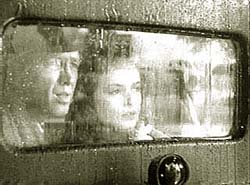I'm going to get grief about this, but Junebug is a beautiful mess of a story. There are some revelatory scenes, much brilliant acting, and a view into some new territory, but the story lacks propulsion. In the last scene, the writer and director try the old trick of whisking the tablecloth from beneath the china. But the crystal crashes to the floor.
Somewhere, David Mamet sagely said, "Film is uninflected juxtaposition." Junebug relies on this aesthetic. There is rich potential for telling contrast among the cosmopolitan Madeleine (Embeth Davitz), her new husband George's (Alessandro Nivola) family, and the primitivist "outsider" artist (Frank Hoyt Taylor) whom she goes to North Carolina to wrangle into her gallery's stable.
Though the movie shapes up as an ensemble piece, this is Madeleine's story. She makes what appears to be critical choice in act two: family or ambition. Madeleine chooses to spend the evening winning the artist David Wark rather than sit by Ashley (the extraordinary Amy Adams) as she loses her first baby at term.
Leading up to the moment Madeleine chooses, she has seen her husband reveal a past she neither knows nor understands (singing an affecting hymn at the church dinner), her brother-in-law as a desperate and angry boy (making a misguided pass at her), her sister-in-law desperate and determined to soldier on through a passionless marriage (idolizing, crushing on Madeleine). None of these developments influence her relationships. Nor do we see them juxtaposed with her ambition. If anything, her ambition is moderate, balanced. Making Wark a client will not make her career, or kick her into the top tier of galleries. Wark himself - oracular, borderline schizophrenic - might have brought her a message from the angels. But she does not hear a mythic truth that stabs her with transformation.
What can we hope for Madeleine, fear for her? She's almost impenetrable. She breaks down at having made the wrong choice. "Why?" isn't clear. Almost to a person, the actors' performances are outstanding, and still there's no wind in the second act.
Uninflected juxtaposition demands design. See any David Mamet movie. You get a little pinch in each scene. Like the painter whose mission is guided by voices and appearances that he paints, director Phil Morrison and writer Angus MacLachlan have sketched something that may happen and left us wonder what that might be.
Wednesday, August 24
Wednesday, August 10
March of the Penguins
Dignity, comedy, birth, death, monogamy. What more can you ask from a hero or a penguin?
This beautiful movie about the Emperor penguins’ annual mating migration across 70 Antarctic miles is a triumph of cold-weather filmmaking remarkably free of the story techniques that motivate many wildlife documentaries. Whether you enjoy the light touch of March of the Penguins will depend on whether you trust the filmmaker.
What makes the movie so vivid are the many things it’s not. Not simply survival story, fight against possible extinction, Chaplin-esque slapstick, sentimental birthing account, and not an educational tract about why penguins do what they do. The structure is as simple as any journey story: they are compelled to leave the comfort of “home,” they go and strive and struggle and mostly survive extreme obstacles, they are transformed (into parents), and they return home. Penguins is as penguins does.
The cinematography is beautiful, the Emperor couples charming, their chicks undeniably endearing the music often cloying, and the narration intrusive without being informative. The penguins' soulful postures suggest how we should feel. But we learn so little about their obstacles and their biology that it is difficult to identify with their plight. So the movie becomes a green-screen against which viewers project themselves, and the drama of their longings and fears. For the birds, this is a journey from place to place for a purpose, not a love story as narrator Morgan Freeman intones. This is what I do not trust. I’m being pandered to.
This beautiful movie about the Emperor penguins’ annual mating migration across 70 Antarctic miles is a triumph of cold-weather filmmaking remarkably free of the story techniques that motivate many wildlife documentaries. Whether you enjoy the light touch of March of the Penguins will depend on whether you trust the filmmaker.
What makes the movie so vivid are the many things it’s not. Not simply survival story, fight against possible extinction, Chaplin-esque slapstick, sentimental birthing account, and not an educational tract about why penguins do what they do. The structure is as simple as any journey story: they are compelled to leave the comfort of “home,” they go and strive and struggle and mostly survive extreme obstacles, they are transformed (into parents), and they return home. Penguins is as penguins does.
The cinematography is beautiful, the Emperor couples charming, their chicks undeniably endearing the music often cloying, and the narration intrusive without being informative. The penguins' soulful postures suggest how we should feel. But we learn so little about their obstacles and their biology that it is difficult to identify with their plight. So the movie becomes a green-screen against which viewers project themselves, and the drama of their longings and fears. For the birds, this is a journey from place to place for a purpose, not a love story as narrator Morgan Freeman intones. This is what I do not trust. I’m being pandered to.
Friday, August 5
Hustle and Flow
DJay's got a problem. As if weren't hard enough being a small-time dealer and Memphis pimp to a skinny white girl, a stripper, and a pregnant heart-of-gold 'ho, he's got dreams. When you pull back the just-right tone of seedy Tennessee, this is a story about work and hope. If you've ever been one thing "but really" something else - actuary/extreme snowboarder, 7-11 night manager/poet - this movie is irresistable. I'm one of those. [Spoilers follow.]
Writer and director Craig Brewer lets DJay (Terrence Dashon Howard) off easy and often. It's why we like DJay. And it's why we think he's sure to fail. Though the first rap song he pens is Beat that Bitch - or softened for ready airplay, Whoop dat Ho - when one of his girls verbally emasculates him and threatens to take whip hand in the household, he throws her out without a whoopin'. DJay gathers around him, thanks largely to coincidence, a handful of talented wannabes and Big Opportunities. Skinny Black, a hometown boy made bad in the rap world, is coming to town. They overcome obstacles to cut a cassette (?) dub of a couple original songs, including You Know It's Hard Out Here for Pimp. Bad wages, poor working conditions, and adversarial labor relations. All that makes pimping hard, but what's at stake if DJay fails? When the power meeting with Skinny goes south, and DJay goes to prison, it is of course, his peeps who bring their collective dream alive.
What's great about the story is the way DJay becomes the designated hope-ster. Nola (Taryn Manning) wants some vague other thing in a future that's better than tricking under the train bridge. Key/Clyde (Anthony Anderson) wants to do original work that has feeling. Contrast this with recording court testimony. Shelby, on percussion and keyboard (DJ Qualls), wants to do other than service vending machines. Nola says it sounds worse than her job. And Shug (Taraji P. Henson), his longtime, wide-eyed, pregnant whore, wants simply to believe in something good for the baby she's about to give birth to. And they all pile on for the ride.
As a parable about believing, and achieving, a dream, Hustle and Flow preaches that it takes a lot of people to give a dream a pulse. If it's a parable about movie-making, then the movie is a shout-out saying that sacrifices must be made, flesh peddled, dreams retailed, drugs purveyed, and in the end fine-tuned talk transforms a thought into an entertainment. And that it's worth it.
Writer and director Craig Brewer lets DJay (Terrence Dashon Howard) off easy and often. It's why we like DJay. And it's why we think he's sure to fail. Though the first rap song he pens is Beat that Bitch - or softened for ready airplay, Whoop dat Ho - when one of his girls verbally emasculates him and threatens to take whip hand in the household, he throws her out without a whoopin'. DJay gathers around him, thanks largely to coincidence, a handful of talented wannabes and Big Opportunities. Skinny Black, a hometown boy made bad in the rap world, is coming to town. They overcome obstacles to cut a cassette (?) dub of a couple original songs, including You Know It's Hard Out Here for Pimp. Bad wages, poor working conditions, and adversarial labor relations. All that makes pimping hard, but what's at stake if DJay fails? When the power meeting with Skinny goes south, and DJay goes to prison, it is of course, his peeps who bring their collective dream alive.
What's great about the story is the way DJay becomes the designated hope-ster. Nola (Taryn Manning) wants some vague other thing in a future that's better than tricking under the train bridge. Key/Clyde (Anthony Anderson) wants to do original work that has feeling. Contrast this with recording court testimony. Shelby, on percussion and keyboard (DJ Qualls), wants to do other than service vending machines. Nola says it sounds worse than her job. And Shug (Taraji P. Henson), his longtime, wide-eyed, pregnant whore, wants simply to believe in something good for the baby she's about to give birth to. And they all pile on for the ride.
As a parable about believing, and achieving, a dream, Hustle and Flow preaches that it takes a lot of people to give a dream a pulse. If it's a parable about movie-making, then the movie is a shout-out saying that sacrifices must be made, flesh peddled, dreams retailed, drugs purveyed, and in the end fine-tuned talk transforms a thought into an entertainment. And that it's worth it.
Subscribe to:
Posts (Atom)


